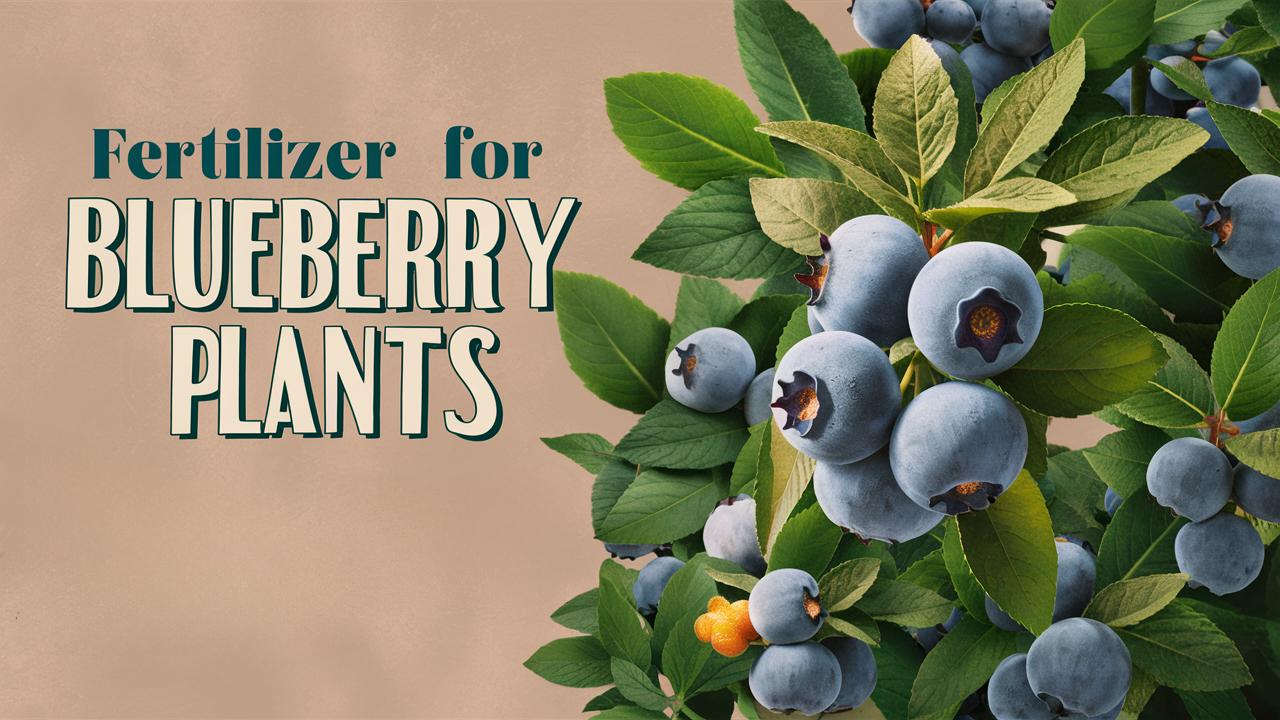In this comprehensive guide, we’ll explore how to select the best fertilizer for your blueberry plants, considering their specific needs and conditions.
Fertilizer For Blueberry Plants
| Image | Name | Rating | Shop |
|---|---|---|---|
 | Berry-tone Organic Fertilizer |  | |
 | Berry Bloom Booster |  | |
 | Acid Mix |  |
Berry-tone Organic Fertilizer
Berry-tones Organic Berry-Tone fertilizer is a great choice for blueberry plants, as well as other types of berries like strawberries and raspberries. It’s a natural and organic formula that promotes bountiful harvests.
The fertilizer comes in a 4 lb bag and contains a rich blend of ingredients enhanced with the exclusive Bio-tone formula. It has a balanced NPK ratio of 4-3-4, which provides essential nutrients for plant growth without toxic ingredients or sludges. Use it when planting or feeding established plants twice a year for optimal results. The best part is that Berry-Tone is environmentally safe and approved for organic gardening, making it a great option for those who care about sustainability.
Berry Bloom Booster
Bloom City’s Organic Berry Best fertilizer is a top pick for anyone looking to give their blueberry plants the best chance to thrive. As an organic solution, it’s free of harsh chemicals that can harm your plants or the environment.
This quart-sized bottle provides 32 oz of concentrated formula that promotes lusher growth and boosts fruit yield in blueberries and strawberries alike. The soil acidifier is particularly beneficial for blueberry plants, which thrive in acidic environments. The best part? It’s a berry (pun intended) all-purpose fertilizer perfect for any type of berry plant.
Acid Mix
The Down to Earth All Natural Acid Mix Fertilizer 4-3-6 is a great choice for blueberry plants. This fertilizer is specifically blended for acid-loving plants like blueberries, and it’s made from all-natural, organic ingredients that are free of chemicals.
One of the perks of using this fertilizer is its slow-release formula, which means you can apply it once or twice a year and get steady results without having to reapply frequently. In early spring, apply it for vegetative growth and again when blooms appear, and in the fall to promote root growth and help your blueberry plants resist extreme winter temperatures.
Acid Fertilizer for Blueberries and Hydrangeas.
The FoxFarm Happy Frog Acid Loving Plant Fertilizer is a top-rated choice for growing healthy and thriving blueberry plants. This slow-release fertilizer is specifically designed for acid-loving plants like blueberries, providing essential nutrients that help them grow and flourish.
This fertilizer stands out from others on the market due to its consistent feeding system, which ensures that your blueberry plants receive a steady amount of nutrients throughout the growing season. The addition of mycorrhizal fungi also helps to improve nutrient uptake and water absorption, developing stronger root systems that support resilient growth. With its natural ingredients and easy-to-follow application instructions, this fertilizer is perfect for organic gardening and provides eco-friendly, sustainable nutrition for your blueberry plants.
Blueberry Fertilizer
Looking for a fertilizer that’s specifically designed for blueberry plants?
TPS NUTRIENTS Blueberry Fertilizer is a great option. This liquid plant food is tailored to meet the needs of acid-loving fruit and berry gardens, making it perfect for those growing blueberries or other types of berries. The formula is carefully crafted to provide essential nutrients that promote healthy growth and development in these types of plants.
One feature that stands out about this fertilizer is its ease of use. The 32 oz (1 Quart) size provides a generous amount of product for a single application, making it convenient for small and large gardens alike. Simply follow the instructions and watch your blueberry plants thrive with a boost of nourishment from this specialized fertilizer.
Perfect Berry Boost
The Liquid Blueberry Fertilizer by Perfect Plants is a well-rounded option for blueberries and other acidic soil-loving fruiting plants. Its 8-8-8 NPK ratio provides a balanced blend of essential nutrients that your plants need to thrive.
This fertilizer is designed to be easy to use, requiring only 2 teaspoons per gallon of water, and one 8 fl oz bottle should last multiple growing seasons. Furthermore, it’s formulated to enhance berry yield, size, and flavor, making it a great choice for gardeners looking to promote healthy, vibrant fruiting plants.
Jobe’s Organic Soil Acidifier
Jobe’s Organics Granular Soil Amendment is a great choice for blueberry plant care. As an organic soil acidifier, it helps to lower the alkalinity in the soil and provides blueberries with the natural sulfur they need to thrive.
This formula is easy to apply at planting time, and can be reapplied 2-3 times per year to maintain the desired pH level for your plants. It’s a non-toxic, OMRI-listed option that’s safe for use in organic gardening and won’t put your blueberries at risk of burning from excessive acidity.
How To Choose The Best Fertilizer For Blueberry Plants
Growing blueberry plants can be a rewarding endeavor for any gardener, both amateur and experienced. Their vibrant colors, delightful fruits, and flexible growing conditions make them a popular choice for home gardens. However, to ensure that your blueberry bushes thrive and produce bountiful harvests, understanding their nutritional needs is crucial. One of the most significant factors in achieving a fruitful yield is choosing the right fertilizer.
Understanding Blueberry Plant Requirements
Before you dive into the world of fertilizers, it’s essential to understand the unique needs of blueberry plants. Blueberries are relatively high-maintenance compared to other fruit-bearing plants, primarily because of their specific soil and nutritional preferences.
Soil pH Sensitivity
Blueberries thrive in acidic soil with a pH level between 4.5 and 5.5. This acidity is vital for their ability to absorb nutrients effectively. Regular garden fertilizers may not be suitable for blueberries due to their potential to alter soil pH adversely. Ensuring your blueberry plants have the right soil pH is the first step toward choosing an appropriate fertilizer.
Nutrient Needs
Blueberry plants require balanced nutrition but have particular sensitivities and preferences. They are especially fond of nitrogen, phosphorus, and potassium (N-P-K), along with micronutrients like magnesium, calcium, and iron. It’s important to choose fertilizers that provide these essential nutrients without upsetting the delicate pH balance of the soil.
Characteristics of the Best Fertilizers for Blueberries
When selecting a fertilizer for blueberry plants, look for specific characteristics that cater to their unique requirements:
1. Acidic Nutrients
As mentioned earlier, blueberries prefer acidic nutrients. Fertilizers formulated for acid-loving plants will typically contain ammonium-based nitrogen sources, which help maintain the desired soil acidity. Look for fertilizers that list ingredients like ammonium sulfate or ammonium nitrate.
2. Slow-Release Formulas
Slow-release fertilizers can be incredibly beneficial for blueberry plants as they provide a steady supply of nutrients over an extended period. This ensures that the plants receive nutrition without the risk of nutrient runoff or rapid pH changes in the soil. A slow-release formula reduces the chances of over-fertilization, promoting healthier growth.
3. Organic Options
For those committed to organic gardening, there are plenty of organic fertilizers available that are suitable for blueberries. Ingredients like composted manure, fish emulsion, and bone meal can provide the necessary nutrients without introducing synthetic chemicals into the soil. Organic fertilizers improve soil health and encourage the beneficial microbial life essential for robust blueberry growth.
4. Micronutrient Inclusion
Blueberries require certain micronutrients for optimal growth and production. When selecting a fertilizer, consider options that provide additional micronutrients, such as iron, zinc, and manganese. These minerals are crucial for chlorophyll production and overall plant vitality.
Popular Fertilizers for Blueberry Plants
With a clear understanding of the characteristics to look for, let’s examine some popular fertilizer options specifically designed for blueberry plants.
1. Blueberry Fertilizer Formulations
Many manufacturers create fertilizers specifically formulated for blueberries. These products often come with an N-P-K ratio designed to meet the requirements of these plants. Common ratios range from 4-4-4 to 6-6-6, providing balanced nutrition complemented with specialized micro-nutrients.
2. Organic Compost
Using well-rotted organic compost is one of the best options for nurturing blueberry plants. Compost improves soil structure, moisture retention, and overall health while providing a steady supply of nutrients. When applying compost, ensure that it is adequately decomposed; fresh organic matter may introduce pests or pathogens.
3. Fish Emulsion
This organic fertilizer is rich in nitrogen and other trace elements beneficial for blueberries. Fish emulsion is an excellent option during the early growing season to promote lush foliage and healthy fruit development. However, be cautious about over-applying, as excessive nitrogen can lead to diminished fruit yield.
4. Bone Meal
Bone meal is another great organic option that provides phosphorus, essential for root development and flowering. It’s an excellent additive when planting new blueberry bushes, helping establish strong root systems leading to better yields.
Time of Application
Knowing when to apply fertilizer is equally important as selecting the right type. Blueberries benefit most from fertilizer applications in early spring, as this aligns with their growing season.
Spring Feeding
In early spring, just as the buds are beginning to swell, apply the recommended fertilizer. This timing supports new growth and sets the stage for a productive flowering period. Some gardeners choose to divide the fertilizer application, adding a smaller amount once more in late spring or early summer, depending on the growth observed.
Soil Testing
Before applying any fertilizer, conducting a soil test can provide valuable information about your soil’s nutrient content and pH levels. Most extension services or local garden centers offer soil testing kits that can guide your fertilization strategy. A soil test will help you understand exactly what your blueberry plants need, allowing for more precise fertilizer choices.
Applying Fertilizer Properly
Even the best fertilizer can have little effect if not applied correctly. Follow these steps to ensure effective application:
1. Calculate the Correct Amount
Always follow the manufacturer’s instructions for the recommended application rate. Over-fertilizing can harm the plants and the surrounding environment, leading to nutrient runoff and harming local ecosystems.
2. Distribute Evenly
Apply the fertilizer evenly around the base of the plants, avoiding direct contact with the stems to prevent burn-out. Using a broadcast spreader can help achieve an even distribution.
3. Watering After Application
After applying fertilizer, water the plants thoroughly. This not only helps initiate the nutrient release from the fertilizer but also prevents any potential concentration at the roots, minimizing the risk of root burn.
4. Observe Plant Health
Keep an eye on your blueberry plants post-fertilization. Signs of over-fertilization may include yellowing leaves, stunted growth, or a lack of fruit. Under-fertilized plants may produce small fruit or abnormal foliage. Adjust your fertilization strategy accordingly based on these observations.
Additional Considerations
Companion Planting
Enhancing your blueberry plants’ health can extend beyond fertilizers. Consider companion planting with other acid-loving plants such as rhododendrons or azaleas. These plants thrive in similar conditions, including soil pH and moisture levels, creating a healthy garden ecosystem.
Mulching
Mulch not only helps suppress weeds but also contributes to acidifying the soil as it decomposes. Pine needles or wood chips make excellent organic mulch options for blueberry plants, helping maintain moisture and contributing organic matter to the soil over time.
pH Management
As previously noted, the importance of soil pH in blueberry cultivation cannot be overstated. If your soil is not acidic enough, consider using sulfur or iron sulfate to lower the pH. Always retest the soil pH after amendments to ensure you’ve reached the desired range.
Environmental Considerations
As more gardeners turn to sustainable practices, it’s essential to consider how fertilizers impact the environment. Over-use of chemical fertilizers can lead to nutrient runoff into waterways, contributing to algal blooms and harming aquatic ecosystems. Opting for organic fertilizers and employing best practices can help minimize your gardening footprint.
Conclusion
Selecting the right fertilizer for blueberry plants can truly make the difference between a mediocre harvest and a bountiful one. By understanding their unique nutrient needs, considering the specific characteristics of suitable fertilizers, and applying them correctly, you can create an environment conducive to the vigorous growth of these delightful bushes.









